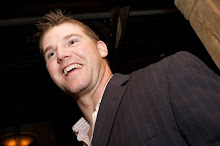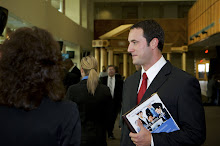Scott Thomas had completed nearly half of his executive M.B.A. program when he decided he wasn't satisfied. The price tag of the Cleveland school was modest, but Mr. Thomas wondered if he would get a solid return on his investment.
Calculate your personal ROI.
So the 31-year-old dropped out and enrolled in Ohio State University's Fisher School of Business E.M.B.A. program. Though his tuition costs have more than doubled -- to $72,500 for the 18-month degree -- Mr. Thomas says he believes Ohio State does more for him in the way of career development and education. "The alumni network is unbelievably large, and they're unbelievably loyal," he says.
Ohio State comes in at No. 3 on The Wall Street Journal's first rating of the five-year return on investment of executive M.B.A. programs. The program yields a 170% return on investment. Only Texas A&M's Mays School of Business and University of Florida's Warrington School of Business did better among U.S. schools, with five-year returns of 243% and 212%, respectively.
Applications for most executive M.B.A. programs are due early next year, and many working executives are weighing whether to make such a hefty investment in an uncertain economy. As companies pull back on education spending, students are increasingly paying their own way -- making cost-benefit calculations even more important. "When someone else was paying for it, that wasn't the big factor," says Michael Desiderio, executive director of the Executive MBA Council in Orange, Calif. Only 32% of executives are fully sponsored by their companies, he adds.
![[The E.M.B.A. program of Columbia University (above) had a lower return than that of UCLA (below).]](http://s.wsj.net/public/resources/images/PJ-AN793_pjEMBA_D_20081209144816.jpg) Associated Press
Associated PressThe E.M.B.A. program of Columbia University (above) had a lower return than that of UCLA (below).
![[ucla]](http://s.wsj.net/public/resources/images/PJ-AN794_pjEMBA_DV_20081209144848.jpg) age fotostock
age fotostockTo determine which schools provide the best return on investment, we dived deeper into the data we collected for The Wall Street Journal's Sept. 30 ranking of executive M.B.A. programs. Working with Management Research Group of Portland, Maine, we scoured the responses from our summer 2008 survey of E.M.B.A. graduates for data about salary, raises received after graduation, company-sponsorship figures, tuition and out-of-pocket costs.
We used that information to calculate the return on investment for 27 U.S. programs and nine international programs. Costs were calculated by combining tuition payouts and the out-of-pocket expenses reported by graduates. To calculate the benefit, or return, we used the graduate-reported median raise after completion of the program as the first-year salary increase. We added a 5% annual increase over the following four years, based on the average annual increase expected by compensation specialists and executive recruiters we polled.
Most of the schools that topped the list weren't big brand names -- or the highest-ranked in our September E.M.B.A. ranking. The No. 1 school in September, Northwestern University's Kellogg School of Management, was No. 12 in returns. Texas A&M and University of Florida, despite high returns, weren't among the top 25 in September.
At Texas A&M, low tuition and a no-frills focus are at the heart of the program. (The Class of 2008 paid just $53,000 for a 21-month program.)
'Focus on the Basics'
"We focus on the basics," says David Blackwell, associate dean of the school's graduate programs. "What they're not getting for their money is a lot of marble and gold-plated fixtures." As a state institution, the school is under less pressure to raise revenue by accepting underqualified candidates, he says.
Texas A&M's tuition is less than half than that of New York University's Stern School of Business, the school with the lowest return on investment -- 51%. Graduates of Texas A&M's program reported receiving a median 11% raise upon completion of the program and five years after graduation were projected to earn a median $181,718 (not including bonuses). "There's more opportunity for them to advance as a result of the program, and a salary goes along with that," says Mr. Blackwell.
Not all of the earlier survey's top-rated schools delivered lower returns. The returns at University of Southern California Marshall School of Business (No. 4 in the overall ranking), University of California-Los Angeles Anderson School of Business (No. 17 in the overall ranking) and Kellogg were significantly better than those of many of their competitors. At UCLA, the five-year return was fourth-best, at 158%. At USC, the five-year return was 134%, and 2008 graduates can expect a median salary of $218,062.
'Blood, Sweat and Tears'
With a five-year salary projection of $257,687 and a 127% return, Kellogg graduates reap significant benefits, despite its programs' average tuition of nearly $105,000. "Going back and getting your M.B.A. is an expense not only in financial terms, but in blood, sweat and tears," says Julie Cisek Jones, director of executive M.B.A. programs at Kellogg.
Even with lower returns on investment, top-tier programs had some of the highest projected five-year salaries. Columbia University's E.M.B.A. Global, a joint program with London Business School, caters to slightly older executives, and clocked in at No. 23 for return on investment, with a 69% return in five years. And 2008 graduates of the school can expect the highest salary after those five years -- with a median of $272,577.
Indeed, some schools had lower returns partly because their graduates' salaries were higher to begin with. Jaki Sitterle, managing director of executive programs at NYU, which posted the smallest return, notes that the school caters to older executives, half of whom already have advanced degrees and many who already earn high salaries.
For many graduates, the value of the E.M.B.A. is not based on salary alone. In our graduate survey, 63.3% of graduates said they received or expected a promotion upon completion of their programs, even as 31.8% did not receive or expect to receive a raise. "Increasing compensation is not always their prime motivating factor," says Ms. Sitterle.
Beyond the Dollar Amount
Alex Gorsky, company group chairman for Ethicon, a unit of Johnson & Johnson, credits the E.M.B.A. degree he earned from Wharton 12 years ago with helping him achieve a top executive position. He in turn has since sponsored 12 people to attend executive M.B.A. programs, even though he says it's difficult to put a dollar amount on the return. "They have a lot of great ideas and I've always found that you get more committed employees," says Mr. Gorsky.
Some school administrators say a school's brand cachet is as important as a calculated return on investment. "We have the most selective admissions processes anywhere," says Howard Kaufold, director of the M.B.A. program for executives at the University of Pennsylvania's Wharton School. "You know when you're coming here that you are going to rub shoulders with people who are very bright and already have an excellent career trajectory." Wharton's E.M.B.A. program, which ranked No. 2 in our September overall ranking, came in at No. 24 for return on investment, with a 65% five-year return.
A school's location and access to executives also can make a difference. "We got speakers from the best companies because they were a subway ride away," says Izzet Bensusan, 32, who completed the Columbia's New York program earlier this year. The program was 26th out of 27 schools for return on investment. Mr. Bensusan, an entrepreneur who recently started a carbon-regulating company, says he paid approximately $130,000 out-of-pocket to attend the program. He says it was worth every penny. "I only paid $130,000, and I got to sit with the best people in the world," says Mr. Bensusan.
Write to Alina Dizik at alina.dizik@dowjones.com





![[Best and Worst Jobs]](http://s.wsj.net/public/resources/images/PJ-AN916_pjBEST_DV_20090105125906.jpg) Scott Brundage
Scott Brundage


![[section=Careers|subsection=Executive-MBA]](http://s.wsj.net/public/resources/images/OB-CU376_EMBA12_D_20081209194215.jpg)
![[The E.M.B.A. program of Columbia University (above) had a lower return than that of UCLA (below).]](http://s.wsj.net/public/resources/images/PJ-AN793_pjEMBA_D_20081209144816.jpg) Associated Press
Associated Press![[ucla]](http://s.wsj.net/public/resources/images/PJ-AN794_pjEMBA_DV_20081209144848.jpg) age fotostock
age fotostock


